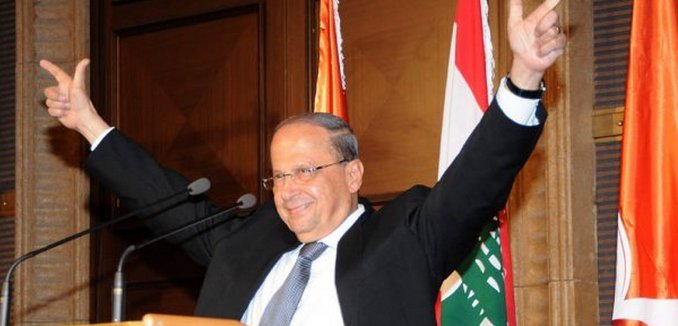The Iran-backed terrorist group Hezbollah is “effectively controlling Lebanon” following the recent election of its ally Michel Aoun to the Lebanese presidency, David Daoud, a research analyst at the Foundation for Defense of Democracies, warned in a Newsweek analysis published on Sunday.
While Iranian Foreign Minister Mohammad Javad Zarif personally visited and congratulated Aoun on his victory, few others outside the Islamic Republic should be celebrating the outcome of the elections, as “odds are high that Aoun’s presidency will end up serving Hezbollah and Tehran’s interests at the expense of Lebanon.”
The last possible brake on Hezbollah’s influence in Beirut was Sa’ad Hariri, leader of the mainly Sunni Future Movement, who ultimately threw in the towel and agreed to support Aoun last month. His reversal, and that of Samir Geagea, head of the Christian party Lebanese Forces, followed over two years of political deadlock that saw Hezbollah block the appointment of a new president during 45 consecutive parliamentary sessions.
Aoun’s election is the latest chapter in his alliance with Hezbollah, which has helped the terrorist group gain more power despite the constraints of Lebanon’s constitutional system.
In 2006, on behalf of his party the Free Patriotic Movement, Aoun signed an agreement with Hezbollah that recognized the terror group’s “right to retain its arms, in defiance of United Nations Security Council Resolutions 1559 and 1701,” Daoud wrote.
In 2011, Aoun’s party collaborated with Hezbollah to topple the government of then-Prime Minister Hariri while the UN-backed Special Tribunal for Lebanon was preparing to indict three Hezbollah members for the assassination of Hariri’s father, Rafiq.
Aoun has also aided Hezbollah’s efforts to gain control of Lebanon’s government in other ways, including by supporting an electoral law that would institute a system of proportional representation and potentially give Hezbollah more than half of the 128 seats in parliament.
Aoun’s position on Iran often aligns with Hezbollah’s own, and led him to threaten Israel in his inaugural address. He favors Iranian influence in the Middle East and has justified Hezbollah’s participation in the Syrian civil war by calling for Lebanon to take “preemptive and deterrent” steps against Sunni jihadists. Aoun also alienated Lebanon from its Arab allies by leading Beirut to vote against an Arab League condemnation of Iran’s involvement in Arab affairs and Hezbollah’s terrorism.
While Aoun has reappointed Hariri as prime minister, together Aoun and Hezbollah will be able to severely limit Hariri’s independence, further cementing their hold on the levers of power in Lebanon.
“Now that Aoun is in office, Hariri and Geagea have nothing more to offer,” Daoud concluded. “Just as importantly, the United States’ receding Middle Eastern role and foreign policies have enabled the regional ascendancy of Hezbollah’s patron, Iran. If anything, the path forward for Lebanon’s new president points not in the direction of moderation, but to Tehran.”
Photo: Imadmhj / WikiCommons ]




